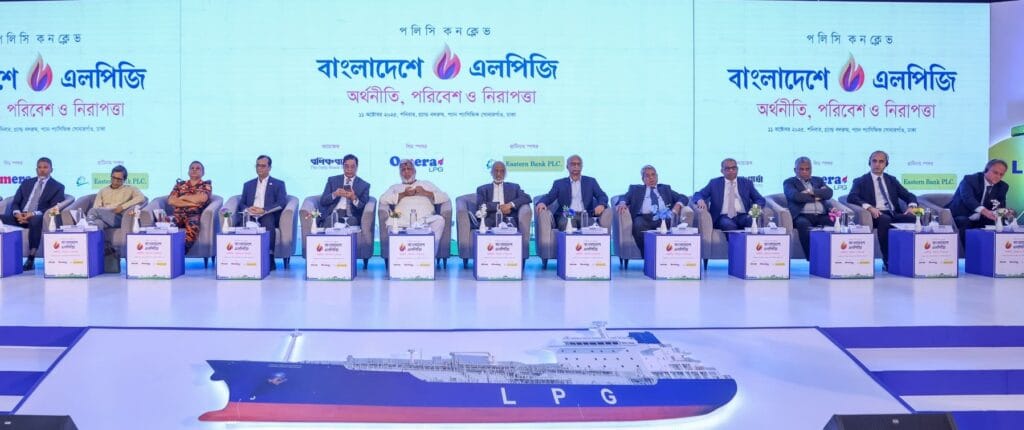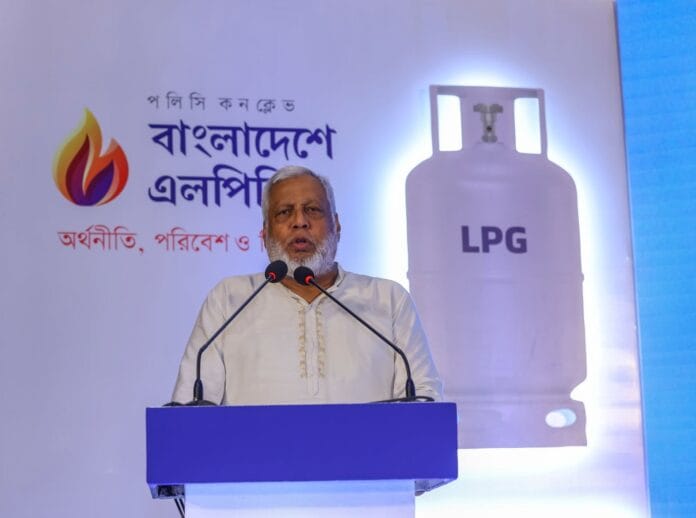Interim government’s Energy Adviser Muhammad Fouzul Kabir Khan has said that the price of a 12-kg Liquefied Petroleum Gas (LPG) cylinder should not exceed Tk1,000, accusing private companies of overcharging consumers.
Speaking at a policy conclave titled “LPG in Bangladesh: Economy, Environment, and Safety” in Dhaka on Saturday, Fouzul Kabir said some retailers are selling LPG cylinders at Tk1,400, although company prices are fixed at Tk1,200. He warned that mobile courts would be deployed to curb such overpricing.
“Traders must take responsibility. Business without accountability cannot continue. A 12-kg LPG cylinder should be sold for less than Tk1,000,” he said.
The event, organised by The Daily Bonik Barta, aimed to promote a sustainable LPG economy, address environmental impacts, and strengthen safety standards in the sector.
The adviser also blamed a section of politicians and their business associates for the current energy crisis.
“We built more power plants than we needed without ensuring adequate fuel supply,” he said. “Numerous illegal gas connections were issued, and these wrong decisions have pushed us toward this crisis.”
He noted that while gas exploration activities have expanded and new drilling rigs are being procured for BAPEX, progress remains unsatisfactory. “Because of these shortcomings, we are now forced to import high-cost LNG,” he added.
Fouzul Kabir stressed that LPG could play a key role in easing the energy shortage, but said the pricing structure must be rationalized. “The private sector dominates this market,” he said. “Entrepreneurs must act responsibly and abandon the culture of excessive profit-making. It’s time to stop building fortunes abroad at the expense of consumers.”
Responding to the adviser’s comments, BNP Standing Committee Member Abdul Moyeen Khan said blaming politicians or traders would not solve the root problem.
“There is no point in finger-pointing,” he said. “Bangladesh’s natural gas reserves are depleting fast. What we need is a long-term plan to manage the coming shortage.”
He added that ensuring affordable and reliable energy should be the nation’s top priority.
“Energy is the key to development. As our economy grows, energy demand will rise. No country can progress without addressing this fundamental issue.”
Bangladesh Energy Regulatory Commission (BERC) Chairman Jalal Ahmed explained that LPG prices are adjusted monthly based on the dollar exchange rate and Saudi Aramco’s benchmark price. “Our main goal is to make LPG more affordable for consumers,” he said, adding that BERC is also working to simplify licensing for traders.

Consumer rights advocate M. Shamsul Alam, energy adviser to the Consumers Association of Bangladesh (CAB), criticized the government’s energy market management.
“There’s chaos in the energy sector,” he said. “Pipeline gas supply was deliberately reduced to create an LPG market. The government must ensure transparency and prioritize safety.”
The conference also raised safety concerns. Fire Service and Civil Defence Director General Brig Gen Mohammad Zahid Kamal said over 1,500 gas-related fire incidents had occurred this year, including around 580 involving LPG. “Training is the only sustainable way to reduce such accidents,” he noted.
Industry representatives expressed frustration over the adviser’s remarks. Amirul Haque, President of the LPG Operators Association of Bangladesh (LOAB), said prices are determined by BERC, leaving little scope for manipulation. “What we need is consistent policy support from the government,” he said.
East Coast Group Chairman Azam J. Chowdhury added, “If the government can supply LPG at Tk1,000 per cylinder while allowing importers a 7% profit margin, we would comply. But that’s simply not realistic under current market conditions.”
A keynote paper presented by Prof M Tamim, Vice-Chancellor of Independent University, Bangladesh, revealed that the country faces a daily gas shortfall of 1.6 billion cubic feet. The nation’s annual LPG storage capacity stands at 1.6 million tons, equivalent to about 400 million cubic feet of gas per day.
The paper also suggested that using LPG in industries could cut production costs by 35–40% compared to diesel, while emitting significantly less carbon than coal or furnace oil.

